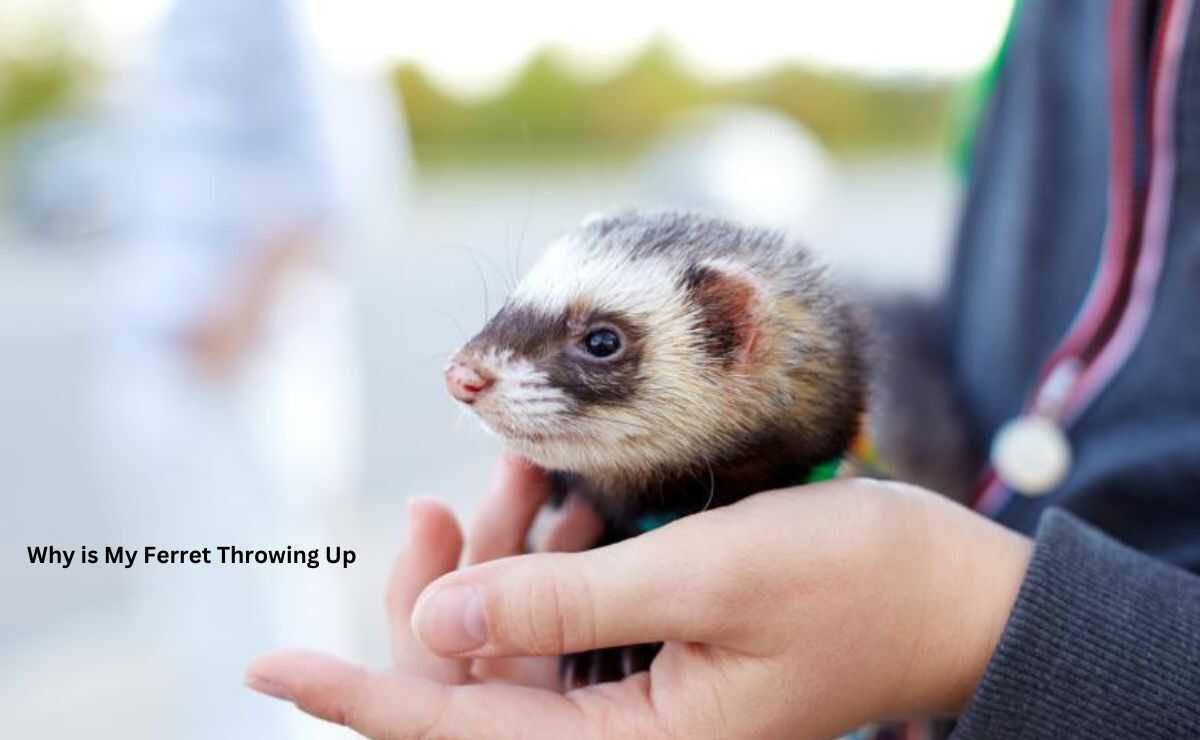Ferrets are small, delicate animals and as such, they are prone to a number of health problems. One of the most common problems ferrets suffer from is vomiting. In this blog post, we’ll discuss the causes of ferret vomiting and what you can do to help your ferret get relief.
We’ll also provide tips on how to prevent your ferret from throwing up and some helpful advice on how to deal with vomiting in general. If you’re looking for answers to your questions about why is my ferret throwing up, this is the blog post for you!
Why is My Ferret Throwing Up?

Your ferret may be throwing up because it is experiencing an upset stomach. Most ferrets will throw up once in a while, but if the vomiting persists or becomes more frequent, it may be indicative of a more serious problem. Some possible causes of an upset stomach in ferrets include:
- Diet change: If your ferret is not getting the proper nutrition, its stomach may become upset and it will begin to throw up. Talk to your ferret’s veterinarian about its diet and see if there are any changes you can make to improve its diet.
- A foreign object in the gastrointestinal tract: Ferrets can accidentally ingest small objects such as feathers or small stones, which can get stuck in their intestines and cause an upset stomach. If you notice that your ferret has been eating unusual items or has been straining a lot when it tries to eat, take it to the veterinarian for an examination.
- A medical condition: If your ferret is displaying any other unusual signs or symptoms, such as excessive thirst or fever, consult with a veterinarian to rule out any possible medical issues.
If you are concerned that your ferret is experiencing an upset stomach, generally the best course of action is to bring it in for a diagnosis and treatment by a veterinarian. Depending on the cause of the disturbance, your ferret may require medication or surgery to correct the issue.
Is it Normal for Ferrets to Puke?
Ferrets are obligate carnivores, which means that their bodies are designed to digest and use only animal-based proteins. This includes anything from tiny insects to large mammals, so ferrets are not necessarily suited to digesting plant-based proteins. In extreme cases, when a ferret consumes a large amount of plant-based protein, it can result in gastrointestinal upset known as puking (or cecal volvulus).
Ferrets that vomit often have difficulty eating or drinking and may become dehydrated. If you notice your ferret vomiting often or if it is showing any other signs of distress, be sure to take it to the veterinarian for a checkup. Ferret puking is usually only a mild inconvenience and can be treated with dietary adjustments or supportive care.
What Should You Do if Your Ferret Throws Up?
If your ferret throws up, it is important to rule out any underlying health issues first. If the ferret is healthy and has recently eaten a well-balanced diet, there is likely no underlying problem.
However, if the ferret is vomiting and has a poor appetite, there may be a problem with their digestive system. In this case, you should take them to a veterinarian for an examination and possible diagnosis.
If the veterinarian determines that there is a problem with the ferret’s digestive system, they may recommend surgery to correct the issue. Other common causes of ferret vomiting include eating something poisonous or eating something that was not meant for them, such as paint or glue.
In these cases, the ferret may need to be hospitalized and will likely require surgery to remove the object from their stomach.
If you think your ferret is throwing up because of something they have eaten, it is important to keep a close eye on them and contact a veterinarian if they begin to show any signs of distress or illness.
What are The Signs of a Ferret Being Sick?
If you are caring for a ferret, it is important to be aware of the signs of sickness in order to take appropriate action. Ferrets are susceptible to a variety of illnesses and conditions, some of which may be minor and treatable while others may be more serious and require professional veterinary care.
Some common signs of illness in ferrets include:
- Poor appetite or lack of interest in food
- Restlessness or pacing
- Increased water consumption or urinating excessively
- Losing weight or becoming excessively thin
- Inability to stay warm or inability to regulate their body temperature
- Unusual behavior, such as aggression or destructive behavior
- Weakness or fatigue
If you notice any of these symptoms in your ferret, it is important to take them to the vet for a checkup as soon as possible. A veterinarian can perform a variety of tests to determine the cause of the illness and may prescribe antibiotics or other treatments to help cure the ferret. In most cases, Ferrets will recover from illness if treatment is started quickly and properly.
Final Words
Ferrets are not able to digest plant-based materials very well, they may experience problems when they consume a large amount of plant material in one sitting. This can lead to a condition called Ferret Acute Diarrhea (FAD), which is characterized by profuse vomiting and diarrhea.
If you suspect your ferret is experiencing FAD, the first step is to bring them immediately to the veterinarian for treatment. The veterinarian will likely prescribe antibiotics in order to cure the ferret of the infection and prevent further complications.
Related Posts
